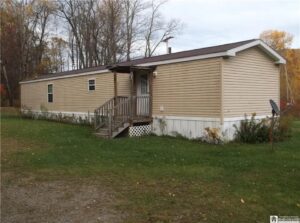Looking to purchase a used mobile home without land? You’re in the right place. These homes, often referred to as “landless mobile homes,” provide an affordable housing option for many. With a rich historical background dating back to the early 20th century, these dwellings have evolved to offer comfort and convenience at a fraction of the cost of traditional housing.
Key Takeaways
Understand the market dynamics when selling a used mobile home without land to set realistic expectations on pricing and timelines.
Familiarize yourself with the legal aspects and ownership rights related to selling a mobile home to avoid any complications during the transaction.
Prepare your mobile home for sale by decluttering, cleaning, and making necessary repairs to attract potential buyers.
Plan ahead for the relocation process by considering transportation logistics and any permits required for moving the mobile home.
Implement effective selling strategies such as staging the home, utilizing online platforms, and working with real estate agents to increase visibility and attract buyers.
Close the sale smoothly by ensuring all paperwork is in order, negotiating terms, and finalizing the transaction securely.

Market Insights
Target Market
The market for used mobile homes without land primarily attracts individuals seeking affordable housing options. Typically, these buyers are looking for cost-effective solutions in areas where traditional real estate may be out of reach.
Affordability and Flexibility
Buyers are drawn to mobile homes without land due to their affordability and flexibility. These properties offer a lower initial investment compared to traditional homes, making them appealing to first-time buyers or those on a budget. The ability to relocate easily adds a layer of flexibility that appeals to individuals who prioritize mobility.
Value Determinants
The value of a used mobile home without land is determined by various factors such as condition, age, and community rather than land appreciation. The overall condition of the property plays a significant role in its value, with well-maintained homes commanding higher prices. Older mobile homes may come at a lower price point but might require more maintenance and upgrades. Furthermore, the community where the mobile home is situated influences its value, with amenities and neighborhood quality impacting pricing.
If you are looking to purchase mobile homes without land through the United States be sure to check out this site www.USMobileHomePros.com
Legal and Ownership
Decoupling Process
When a mobile home is separated from the land, it transitions from real estate to personal property. This change in classification can have legal implications. Mobile homes are considered chattel when not attached to land, affecting their ownership status.
Understanding the intricacies of decoupling a mobile home from land ownership is crucial for both buyers and sellers. Sellers must be aware of the legal processes involved in transferring ownership rights without the land component. This includes obtaining the necessary permits and ensuring compliance with local regulations.
Mobile Home Parks Regulations
Selling a used mobile home without land often involves transactions within mobile home parks. Sellers should carefully review lease agreements and park rules to ensure compliance with regulations. Understanding these rules is essential for a smooth sales process and to avoid any legal disputes.
Mobile home park management may have specific requirements for selling homes within their premises. Sellers must adhere to these guidelines to maintain a harmonious relationship with park owners and other residents. Failure to comply with park regulations could result in eviction or legal action.
Obtaining a New Title
To legally transfer ownership of a mobile home without land, sellers need to obtain a new title reflecting the change in ownership status. This process involves submitting relevant documentation, such as bills of sale, previous titles, and any required forms to the appropriate authorities.
The new title will classify the mobile home as personal property rather than real estate. Sellers must follow all procedures outlined by local motor vehicle departments or relevant agencies to ensure that the title transfer is legitimate. Failure to obtain a new title could lead to complications in future transactions.

Preparing for Sale
Essential Documentation
Sellers should ensure they have vital documents like the title and park lease agreements in order before listing a mobile home without land. These papers establish ownership and are crucial for a smooth sale process.
It is advisable to gather all necessary paperwork, including any maintenance records or warranties, to present a comprehensive listing to potential buyers. Having these documents readily available can instill confidence in the buyer and streamline the transaction.
Aesthetic Preparation
To attract more buyers, sellers should focus on enhancing the visual appeal of the mobile home. Simple repairs, such as fixing leaks, replacing worn-out flooring, and applying a fresh coat of paint, can significantly increase its value.
Cleaning the interior thoroughly and decluttering the space can create a welcoming atmosphere for potential buyers during showings. Staging the home with minimal furniture and decor can help them envision themselves living in the space.
Pricing Considerations
When determining the asking price for a used mobile home without land, sellers must take into account various factors. The overall condition of the property, including its age, structural integrity, and any necessary repairs, plays a significant role in pricing.
In addition to the physical state of the home, sellers should also consider potential relocation costs for the buyer. Factors such as moving expenses or setting up utilities at a new location can impact the perceived value of the property.
If you are looking to purchase mobile homes without land through the United States be sure to check out this site www.USMobileHomePros.com
Key Takeaways
Understanding the purpose of feeder cables is crucial for efficient power distribution in mobile homes.
Consider the materials and voltage capacity of feeder cables to ensure safety and optimal performance.
Aluminum feeder cables offer specific features that make them suitable for mobile home applications.
When selecting feeder cables, prioritize compatibility with your mobile home’s electrical system for seamless integration.
Adhering to industry standards for cable selection guarantees reliability and compliance with safety regulations.
Follow guidance on the cable selection process to make informed decisions based on your mobile home’s power requirements.
Quit Hunting for the Correct Feeder Cable for Your Mobile Home. Most hardware stores don’t carry what you need. Order here and have it shipped directly to your doorstep.
Purpose of Feeder Cables
Primary Function
Feeder cables in mobile home connections carry electrical power from the main power source to the distribution panel inside the mobile home. They act as the lifeline for transmitting electricity throughout the dwelling.
Feeder cables are essential components that ensure a stable and reliable power supply, enabling various appliances and devices within the mobile home to function properly. By securely transporting electricity, these cables facilitate a safe and efficient energy flow within the living space.
Importance of Compliance
Compliance with the 2011 National Electrical Code is crucial when installing feeder cables in mobile homes. This code sets forth regulations and standards that aim to enhance electrical safety and prevent hazards related to wiring installations.
Adhering to the guidelines outlined in the National Electrical Code ensures that feeder cable installations meet industry standards, reducing the risk of electrical faults, fires, or other safety issues. It is imperative for individuals involved in mobile home electrical work to stay updated on these regulations to guarantee a secure electrical system.
Specific Requirements
When it comes to permanent wiring in mobile homes, utilizing Southwire® Type feeder cable is recommended. This type of cable is specifically designed for mobile home feeder applications, offering durability, flexibility, and reliable performance.
Southwire® Type mobile home feeder cable features high-quality materials and construction that meet stringent industry requirements. Its design ensures optimal conductivity and insulation properties, making it suitable for long-term use in mobile home electrical systems.

Relocation Process
Obtaining Permits
When relocating a used mobile home without land, the first step involves obtaining necessary permits. These permits are essential to ensure compliance with local regulations and safety standards. It is crucial to check with the local authorities for specific permit requirements before initiating the relocation process.
Selecting a Moving Service
Choosing a reputable and experienced moving service is paramount when relocating a mobile home. Look for companies that specialize in transporting mobile homes and have a track record of successful relocations. Ensure that the chosen company is licensed, insured, and equipped to handle the size and weight of your mobile home.
Seller Coverage of Relocation Costs
In some cases, sellers may offer to cover part or all of the relocation costs to attract potential buyers. This can be an attractive incentive for buyers, especially if they are concerned about the expenses associated with moving the mobile home. Sellers should consider this option as it can make their property more appealing in a competitive market.
Importance of Licensed Moving Services
Opting for a licensed moving service is crucial during the relocation process of a mobile home. Licensed companies adhere to state and local regulations, ensuring that the relocation is conducted safely and legally. Working with licensed movers also provides added protection against any unforeseen incidents during transportation.
If you are looking to purchase mobile homes without land through the United States be sure to check out this site www.USMobileHomePros.com

Selling Strategies
Highlighting Features
When selling a used mobile home without land, it is crucial to emphasize the features that appeal to potential buyers. Consider showcasing unique aspects such as upgraded appliances, spacious layouts, or energy-efficient additions. By highlighting these key elements in your listing, you can attract more interest from prospective purchasers.
Focusing on the selection of features that align with the preferences of your target market can significantly enhance the appeal of your mobile home. For instance, if your property caters to families, emphasizing child-friendly amenities like a backyard play area or proximity to schools can make your listing more enticing to this specific demographic.
Effective Marketing Approach
To increase the chances of a successful sale, it is essential to adopt an effective marketing approach when listing your used mobile home. Utilize high-quality photos that showcase the property in its best light and provide detailed descriptions that highlight its unique selling points. This strategy not only captures the attention of potential buyers but also helps them envision themselves living in the space.
Moreover, consider leveraging online platforms and real estate services that cater specifically to mobile homes. By choosing the right platforms for listing your property, you can ensure maximum visibility among individuals actively seeking this type of housing. Tailoring your marketing strategy to reach the appropriate audience increases the likelihood of attracting serious inquiries and offers.
Strategic Pricing and Logistics
When determining the pricing for your used mobile home, take into account factors such as market trends, comparable sales in the area, and the condition of your property. A competitive pricing strategy can generate more interest and potentially lead to a quicker sale. Offering flexible financing options or incentives can further sweeten the deal for potential buyers.
In terms of logistics, streamline the selling process by organizing viewings efficiently and being responsive to inquiries from interested parties. Clear communication and prompt follow-ups can help build trust with potential buyers and facilitate a smooth transaction. By ensuring a seamless experience for both parties involved, you increase the likelihood of closing a successful sale.
Closing the Sale
Negotiation Strategies
When finalizing the sale of a used mobile home without land, negotiation plays a crucial role. Sellers should be prepared to negotiate on the price, terms, and conditions with potential buyers. It’s essential to understand the market value of similar properties and set a competitive yet reasonable asking price. Offering incentives like covering closing costs or including appliances can sweeten the deal and attract more buyers.
Legal and Financial Preparation
Before completing the transaction, sellers must ensure all legal and financial aspects are in order. This includes verifying ownership documents, ensuring compliance with local regulations, and confirming that there are no outstanding liens or debts attached to the property. Hiring a real estate attorney to review contracts and oversee the closing process can provide added protection for both parties involved.
Securing Financing
Securing financing for the purchase of a used mobile home without land is another critical aspect of closing the sale. Buyers may opt for traditional mortgage loans or explore alternative financing options such as personal loans or seller financing. Sellers can facilitate the process by providing necessary documentation promptly and cooperating with appraisals or inspections required by lenders.
Transaction Completion
Once negotiations are finalized, all legal checks are completed, and financing is secured, it’s time to proceed with the transaction. Sellers should ensure that all paperwork is accurately filled out, signed, and notarized as required by law. The closing process typically involves transferring ownership rights, disbursing funds, and recording the sale with relevant authorities.
Prospective Buyers Evaluation
Before finalizing the sale, sellers should carefully evaluate prospective buyers to ensure they have the financial means to complete the transaction. Requesting pre-approval letters from lenders or proof of funds can help verify buyers’ credibility and reduce the risk of deals falling through due to financing issues.
Final Thoughts
Market Trends
The market for used mobile homes without land is witnessing a surge in demand due to factors like affordability and flexibility. As more people seek cost-effective housing solutions, the potential for selling such properties remains high. With the rise of remote work and digital nomadism, there’s an increasing need for movable living spaces, driving the classification of used mobile homes as viable alternatives.
Future Prospects
In the coming years, experts predict a steady growth in the title of used mobile homes without land as a lucrative investment opportunity. The evolving preferences of homebuyers towards minimalistic living and sustainable practices are expected to further elevate the appeal of these properties. As environmental consciousness continues to shape consumer choices, eco-friendly features in mobile homes will likely become a key selling point.
Recommendations
For individuals considering selling their used mobile home without land, it’s crucial to focus on enhancing curb appeal and functionality. Simple upgrades such as fresh paint, landscaping improvements, and decluttering can significantly boost the property’s attractiveness. Pricing competitively based on market trends and conducting thorough inspections to address any maintenance issues can expedite the selling process.
Key Advice
When preparing to sell a mobile home without land, engaging with reputable real estate agents or online platforms specializing in such properties can streamline the listing process. Leveraging professional photography and virtual tours can attract potential buyers and showcase the unique features of the home effectively. Moreover, being transparent about the property’s condition and history builds trust with buyers and increases the likelihood of a successful sale.
Closing Thoughts
You’ve now gained valuable insights into selling a used mobile home without land. Understanding the market, legal aspects, and effective selling strategies is key to a successful sale. By preparing well, navigating the relocation process smoothly, and closing the sale strategically, you can maximize your returns and ensure a seamless transaction.
Take action now by applying these tips to your own situation. Whether you’re downsizing, upgrading, or simply looking to sell, following these guidelines will help you achieve your goals efficiently. Stay informed, stay proactive, and make the most out of selling your used mobile home without land.
Frequently Asked Questions
Can I purchase a used mobile home without land?
Yes, you can buy a used mobile home without land. These homes are often placed in mobile home parks or leased lots. Ensure you understand the legal implications and ownership rights before making a purchase.
What are some legal considerations when buying a used mobile home without land?
Legal aspects include verifying the title, any liens on the property, and ensuring compliance with local zoning laws. Consult with a real estate attorney to review contracts and ensure a smooth transaction.
How should I prepare a used mobile home for sale without land?
Clean and declutter the home, make necessary repairs, consider staging to enhance appeal, and gather all relevant documentation like maintenance records. Highlight unique features to attract potential buyers.
What is the relocation process for a used mobile home without land?
Relocating a mobile home involves hiring professional movers, obtaining necessary permits, disconnecting utilities, and preparing the new site. Plan ahead to minimize disruptions during the relocation process.
What are effective selling strategies for a used mobile home without land?
Utilize online listings, social media platforms, and real estate websites to reach a wider audience. Highlight the affordability, amenities, and location benefits of your mobile home to attract interested buyers.
How do I close the sale of a used mobile home without land?
Work closely with the buyer, real estate agents (if involved), and legal professionals to finalize the sale contract. Ensure all paperwork is in order, conduct a final walkthrough, and facilitate the transfer of ownership smoothly.
Any final thoughts on selling a used mobile home without land?
Selling a used mobile home without land requires thorough research, proper pricing strategies, effective marketing techniques, and clear communication with potential buyers. Stay informed about market trends and be prepared for negotiations throughout the selling process.
You might be interested in these articles:
Problems With Your Septic Tank: Common Issues & Fixes
Replacement Windows for Mobile Homes: Benefits, Types & Tips

